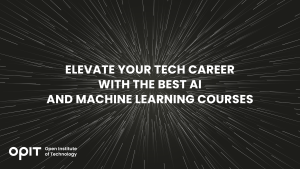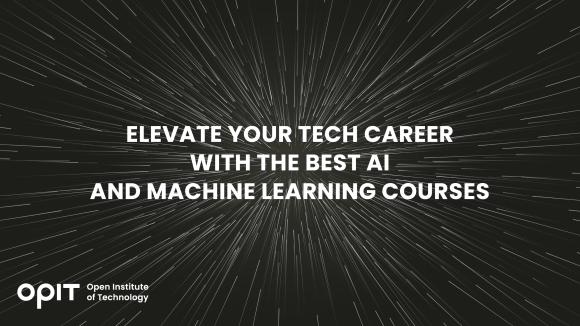

Artificial Intelligence (AI) and machine learning are two of the fastest-growing emerging technologies right now. In late 2022, generative AI burst onto the tech scene in the shape of ChatGPT and its antecedents. However, that’s not the first time AI has made a major impact. In fact, the first AI chatbot, Eliza, was around in the 1960s.
Both AI and machine learning do far more than chat and research. AI is embedded in analytics, predictive forecasting, and monitoring for multiple industries. As the use of AI and machine learning expands, the need for professionals with relevant skills is also growing exponentially.
OPIT (Open Institute of Technology) provides top-tier education in various tech fields, including highly respected machine learning and artificial intelligence courses. Let’s take a look at these fascinating technologies and how the right AI machine learning course can elevate your tech career.
Understanding AI and Machine Learning
When you’re searching for courses on artificial intelligence and machine learning, it helps to have a basic definition for both terms. If you already work in the tech industry, you likely work with one or both of these technologies every day. Yet they’re often so embedded within systems or apps that you might not even realize.
AI refers to the computer’s to exhibit behavior that replicates human thought patterns. However, the details of this definition are a little more complex than that. “Computers” can mean anything from a small subsystem to a supercomputer. It can also mean your smartphone or an app. And, by emulating human behavior, experts don’t necessarily mean AI does things exactly like us. Truly “thinking” AI with genuine cognitive abilities is a long way off.
What AI actually does is take things humans can already do – and do it faster and more often. Think about a software DevOps team requiring automated monitoring and testing of code prior to deployment. AI can do this while checking for vulnerabilities and producing relevant, actionable reports. In healthcare, AI uses pattern recognition to diagnose diseases quickly.
Machine learning is a subset of AI. It focuses on using algorithms to consistently and continuously improve pattern recognition for AI that appears to “learn.”
Courses in AI and machine learning are so popular because of the inherent usefulness of these technologies. Learning these skills now is a way to future-proof your tech career.
The Best AI and Machine Learning Courses
Numerous artificial intelligence and machine learning courses cover different topics and niches. You may choose to learn in a classroom setting or remotely. Some courses are short-term, generally covering foundational aspects of AI. Others carry on over several months for a deeper learning experience. Always consider how the course you invest in will impact your career advancement opportunities.
Absolute beginners may benefit from the Coursera IBM Applied Professional Certificate. This course runs entirely online over three months, presuming you can commit to 10 hours a week. Students learn the basics of AI, particularly how it powers IBM’s Watson AI services.
Oxford Online runs a 6-week online AI program course requiring 7-10 hours of commitment a week. This course looks at AI concepts and business cases for implementation and takes a glimpse at the future of AI.
For classroom-based courses on AI and machine learning, prospective students are best placed to contact local educational institutions. Offline courses vary in length, depth, and usefulness, so always check the syllabus and what certification you gain. It’s worth considering how far you’ll have to travel to gain a qualification.
One of the biggest challenges with AI is making it ethical. OPIT addresses that head-on with the MSc in Responsible AI. Learn advanced AI skills while keeping inclusivity and human interest at the heart of every aspect of the syllabus.
OPIT also offers other courses that consider the impact AI has on modern business practice. Undergraduates could consider the BSc in Digital Business, which includes a full Introduction to AI segment. There are also elective topics, including AI-Driven Software Development.
The Structure of AI and Machine Learning Courses
What should you expect from the best courses on AI and machine learning? Each course has a specific length, either in terms of study hours or a set deadline date. Most online courses have a specific intake date to make sure students get the right support at the right time.
Once you start your machine learning and AI course, you can expect a good balance between theory and practical application. For example, OPIT’s master’s degree course starts with foundational theory and critical thinking around ethics in AI. From here, students get to handle complex data sets. They program in Python and learn how to design effective AI-powered data pipelines.
The structure of your course will depend on the focus, but to give you the best foundation, courses may follow a similar pathway to this:
- Basics of AI, including the differences between AI and machine learning
- Discovering applications of AI — these may be general or industry-specific, depending on the nature of your course
- Data collation, analysis, and visualization
- Programming for AI
- Natural language processing (NLP) and natural language generation (NLG)
- Removing or preventing bias in AI training
Some courses will also offer advanced elective programs, such as understanding AI within the sphere of FinOps (financial operations) or business strategy. If you have a particular industry you’re hoping to excel in, look out for courses with topics that could help you further those ambitions.
Online AI and Machine Learning Courses: Flexibility and Accessibility
Choosing one of the best machine learning and AI courses to do online offers more benefits than new skills. Online learning allows you to study in your preferred environment and at your own pace. You just need to make sure you keep an eye on set deadlines.
You’re not distracted by a class full of people, but you still have access to tutors and support. Many open learning institutes have online communities of students. These are great for preventing isolation and gaining advice.
As a tech professional, the ability to set your own study schedule is essential. Online AI and machine learning courses provide flexibility, allowing you to learn as you work. With OPIT’s Master’s Degree in Responsible Artificial Intelligence, you could potentially have an MSc in 12-18 months without taking any time off work.
Key Skills Gained from AI and Machine Learning Courses
When choosing your online course on AI and machine learning, consider the skills you’ll learn. You should expect to cover:
- Data preprocessing
- Data cleansing
- Data visualization and storytelling
- Linear and nonlinear dimensionality reduction
- Manifold learning
- Human-centered AI design
- Language-agnostic AI programming skills
An MSc in AI and machine learning provides specialized skills and knowledge that you can use to address complex AI challenges in just about any industry.
Choosing the Right AI and Machine Learning Course for You
Picking the right AI and machine learning course is simpler when you consider your goals. Do you want a quick upskill and insight into emerging technologies? Or do you want an immersive course that empowers you to take on new career challenges? Most AI and machine learning courses will provide guidance on the type of career students could hope to pursue after completion.
Always look at the syllabus of a course and see if it meets your personal goals. If you’re unsure about any aspects, contact the education provider for more information.
OPIT’S MSc in Responsible Artificial Intelligence: An Overview
If you’ve decided an online AI and machine learning course is for you, as a graduate, an MSc is the natural choice. The next intake for the OPIT MSc in Responsible AI is September 2024, and details on how to apply are online.
What are the benefits of taking this course?
- A fast-track option to gain your master’s degree in just 12 months
- Fully inclusive fees — no hidden charges
- Various scholarship and funding options
- Availability of early-bird discounts
- Access to academic leaders from all over the world
- Education with an EU-accredited institution
Your MSc course covers every aspect of AI you might require for a career in AI and machine learning. Topics start with AI and ethics and quickly move into human-centered design, computer vision, and how AI impacts IoT and automation.
As you move into your final term, you start your MSc thesis, which focuses on AI projects with industrial relevance. There’s also the opportunity to pursue an internship to complement your thesis and gain vital experience.
AI and Machine Learning Courses for a Future-Proof Career
AI is now part of most growing industries, from property and real estate to healthcare and social care. Tech professionals have the opportunity to upskill themselves and move into fields that they have a real passion for. Organizations are looking for and willing to pay high salaries for knowledgeable, qualified AI experts.
Taking the time now to embark on machine learning and AI courses could speed your journey along your chosen career trajectory.
Have questions?
Visit our FAQ page or get in touch with us!
Write us at +39 335 576 0263
Get in touch at hello@opit.com
Talk to one of our Study Advisors
We are international
We can speak in:




